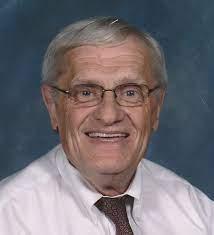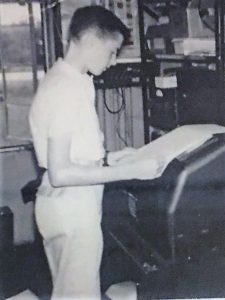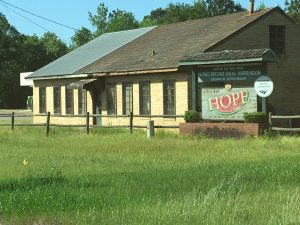A BOYHOOD FACINATION RESULTS IN LIFELONG BROADCASTING CAREER/How Jerry Westmoreland has used voice to be servant of citizens and his community

Try to imagine yourself as a young teen employee, working at the local radio station in one of your first jobs, late in the broadcast day in November, 1963.
Jerry Westmoreland was that young employee, who, at the time, was in the early stages of a career in broadcasting and was still learning the ins and outs of KXAR-Radio in Hope. Conveniently located at 1490 on the AM dial.
KXAR radio was as familiar in the local households as a coffee pot and was known for terrific music, live productions, and of course, news gathering.
The station shared it all with listeners in their houses, cars, department stores, just about everywhere had a radio on during those times.
It was many times the only way local folks got their news of any sort.
The Associated Press News teletype machine began its familiar rattle, typing out a news item from down the line. Literally.
This time, these were very heavy words that were on the strip of paper that the young Westmoreland HAD to read to the public. And read. And read again.
President John F. Kennedy had been assassinated as he rode in a motorcade through downtown Dallas.
A nation felt shattered. And it was Westmoreland’s job to somberly let our little area of the world begin its grieving.
Because he did his job that day as a professional, he took another giant step in a budding career that has spanned more than six decades.
Few would argue that Westmoreland has served his hometown and surrounding communities with an easy-on-the-ear voice while his words smoothly delivered accurate information.
Many rural stations when Westmoreland was getting involved had limited reach due to weak wattage, but there were “blow-torch” stations with huge wattage that were operating 24 hours a day.
That wattage allowed a listener in Hope to enjoy the news and fresh jazz music out of New Orleans on the legendary station WWL without ever leaving their own kitchen.
So, Westmoreland’s introduction into his lifelong passion came at a key time in broadcasting.
But some background first.
Westmoreland is a Prescott native born in 1945. He is the son of Gilbert and Rachel Westmoreland.
His father operated the West Side Grocery store in Prescott, opening the store when he returned from WWII in 1946 and later passed away, claimed by cancer in 1989 at 67-years-old. His mother was a respected school teacher in the area.
But it was his grandmother, Leda Black, who encouraged and challenged the young and impressionable Westmoreland to look to his future.
Westmoreland explains early in our recent interview on a bench in the heart of Hope just in front of the depot.
“She pushed me to do more and to be more,” he says. “She was a true mentor.”
Westmoreland had a fascination for radio since he was eight-years-old, around 1953-‘54.
A forgotten radio-hack fact occurred in 1954 as music icon and Arkansas native Johnny Cash performed live on the radio for the first time at KWEM out of West Memphis.
In those days, having your record played on influential radio stations meant stardom for many. (See the wonderful film “O Brother, Where Art Thou” for more on this subject.)
But for Westmoreland, his radio world was restricted to what the local area could provide through such stations as KXAR and the Texarkana-based KOSY.
“When I was 12, I got myself a train ticket from Prescott on Easter Sunday, of all days, and came to Hope where I caught a taxi and the driver took me out to KXAR.
“When I arrived at the station, L.B. Tooley, was there working on the “board” filling in for another broadcaster.”
So Westmoreland asked politely if he could simply look around and see the inner-workings of a place that held his fascination like a shiny coin.
That led to another Sunday meeting at the station and more nourishment for a youngster aching to go to work.
And at age 13, Tooley says “’Jerry, I think we could find something here for you,’” Westmoreland states. “And, I said I would work here for nothing!”
So, Westmoreland began working at KXAR, taking care of responsibilities at the station on Saturdays and Sundays. He went to work soaking up his craft like a sponge.
“Back then, on Saturday mornings, there was a program called the “Hi-Fi Coca-Cola Club”, where youngsters would come to our large studio and dance,” Westmoreland exclaims. “It was just like American Bandstand.”
Readers, can you imagine the twisting and turning going on during those Saturday mornings in this little town? And many readers of this fine newspaper may have actually attended such dances, but not telling!
One can surely bet there were more palpitating kids’ hearts inside that studio than inside the walls of the local hospital.
KXAR in those years would sign off the air at 6:30 p.m. and many days it was Westmoreland’s voice wishing you and yours a pleasant evening. After that, city volunteers would roll up the sidewalks and it was time for bed.
Just kidding.
As is true with many radio stations, formats come and formats go, so when the widely known radio personality Haskell Jones became General Manager of KXAR, rock and roll strolled out the door in favor of a newer format.
A big break in radio for Westmoreland came in the form of Jones giving him the Sunday morning church shows with ministers who broadcast from the studio live each week.
So, at age 14, a young Westmoreland unlocked the station every Sunday, had the broadcast day underway and worked completely “live” the entire morning with the ministers.
Folks, do you know anything about walking a tightwire between two buildings? That’s the same feeling as being alone in a radio studio with a “live” microphone.
However, there are naturals. Westmoreland was a natural.
“Haskell Jones promised me as soon as I graduated high school that I’d have a full-time job at KXAR,” Westmoreland states.
“So, I finished high school in three years,” he continues
Later, Westmoreland landed complete full-time announcing position with KXAR at the age of 17. He continued to study radio management under Haskell Jones and readying himself for future opportunities.
Which brings us back to the fateful day when Westmoreland received the news at the station that President Kennedy had been shot.
“I was there alone that Friday and we had a 15-minute public service announcement on at the time,” as Westmoreland recounts the story.
Everyone, (who was alive on that day) knew where they were and what they were doing when the tragic news broke.
“I knew it was big because the AP teletype machine rang five bells to get our attention and that meant something urgent was about to come across,” he states.
“I could feel the gravity of the moment as I approached the microphone and knew that this was a big, big story to break.
“The very next day, it was Jack Ruby shooting Oswald and I broke that story too,” he exclaims as the events following the assassination on that day were caught live on television cameras as well, virtually assuring the United States was losing its innocence in front of our very eyes.
And inside our ears through the radio.
“It was the biggest news I ever read,” he concludes.
While Westmoreland worked at KXAR, he had another passion, a calling similar to his announcing and that was the ministry. In 1964 he was licensed as the Assistant Minister at First Methodist Church which sat on the property that Atwood’s currently occupies.
“Ministry was a true calling for me,” Westmoreland says. “Nothing came out of the sky and said for me to preach, but I couldn’t go to church enough. I couldn’t read the bible enough.”
Although he wasn’t able to attend church as a youth; he got that steady dose of religion coordinating those live shows each Sunday at KXAR.
In essence, a young Westmoreland was serving then the ministers and pastors of our time who were themselves serving their listeners and serving God at the same time too.
That’s unofficially called a “win-win-win” for God in church vernacular.
Westmoreland was also quick to mention the “first voice of KXAR” George Frazier, would provide much appreciated advice and help advance ideas for promotional success to the young station manager.
Westmoreland has worn many hats in our little corner of the world, but the element in his life that remains consistent is “service”.
He parlayed a passion for radio as a child into a career that has now become a lifetime of service be it on the airwaves or in person at Harmony United Methodist church in Emmett.
This little town called Hope and those within a radio’s earshot have all benefited because of Jerry Westmoreland’s voice and the words he shared with us.

A teenager then, Jerry Westmoreland reading news from the AP Teletype machine. The same machine that delivered the announcement of President John F. Kennedy had been assassinated.

The KXAR building as seen today.



